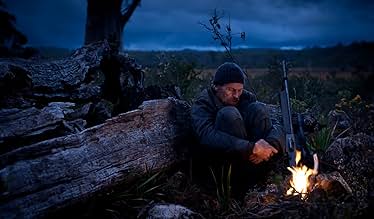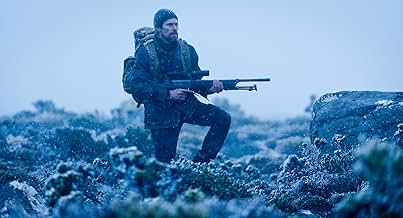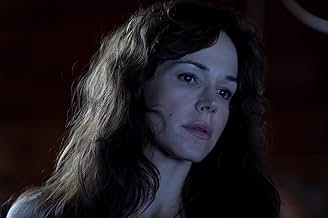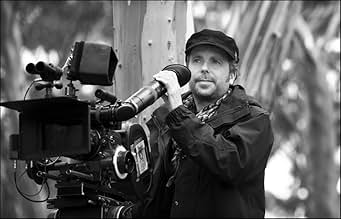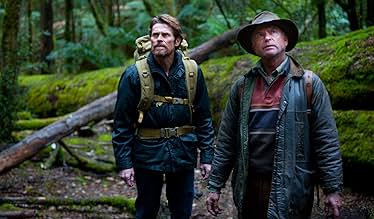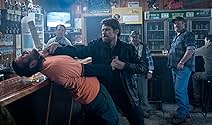VALUTAZIONE IMDb
6,7/10
42.245
LA TUA VALUTAZIONE
Il mercenario Martin viene inviato dall'Europa da una misteriosa compagnia di biotecnologie nelle terre selvagge della Tasmania per cacciare l'ultima tigre della regione.Il mercenario Martin viene inviato dall'Europa da una misteriosa compagnia di biotecnologie nelle terre selvagge della Tasmania per cacciare l'ultima tigre della regione.Il mercenario Martin viene inviato dall'Europa da una misteriosa compagnia di biotecnologie nelle terre selvagge della Tasmania per cacciare l'ultima tigre della regione.
- Regia
- Sceneggiatura
- Star
- Premi
- 4 vittorie e 23 candidature totali
Recensioni in evidenza
Opening (coincidentally) during the San Francisco International Film Festival, "The Hunter" would fit right in among the 175 films being shown there. This Australian film, filmed mostly in Tasmania, stars the great character actor Willem Dafoe (in a rare leading role) as Martin David, the title character. David is engaged by a multinational corporation to track down the last surviving "Tasmanian Tiger" so that they may have exclusive rights to its DNA. David must do this under the noses of environmentalists trying to stop deforestation and the locals whose jobs and livelihoods rely on it.
Masquerading as a scientist doing research, Martin finds himself quartered at the house of a local activist's widow (Frances O'Connor) and her two children (Morgana Davies and Finn Woodlock.) Slowly, he finds himself entwined in their lives and finds a disturbing connection between his current employer and the late activist. Martin's contact in the community (Sam Neill) is wary of their growing relationship and sets things in motion that will have a devastating impact on all involved.
This is a beautiful, exciting film with nuanced performances from all the players. Dafoe's character doesn't say much, but his cragged face is as expressive a tool as his voice. Lengthy scenes are often dialogue-free, letting the surroundings and Martin's actions speak for themselves in a visual language. The juvenile performers are quite good, and Sam Neill is a welcome presence in any film.
Part character study, part eco-thriller, the film does not beat you over the head with its environmental message. It manages to present somewhat of a balanced view of the debate between economy and environment (at least with regards to the problems of the locals. Multinational Corporations are ALWAYS evil.) PETA may take exception to Martin's final actions with regards to his original assignment, but after some thought they might be hard pressed to come up with any better solution. It's the kind of film that leads to great discussion and debate afterwards.
www.worstshowontheweb.com
Masquerading as a scientist doing research, Martin finds himself quartered at the house of a local activist's widow (Frances O'Connor) and her two children (Morgana Davies and Finn Woodlock.) Slowly, he finds himself entwined in their lives and finds a disturbing connection between his current employer and the late activist. Martin's contact in the community (Sam Neill) is wary of their growing relationship and sets things in motion that will have a devastating impact on all involved.
This is a beautiful, exciting film with nuanced performances from all the players. Dafoe's character doesn't say much, but his cragged face is as expressive a tool as his voice. Lengthy scenes are often dialogue-free, letting the surroundings and Martin's actions speak for themselves in a visual language. The juvenile performers are quite good, and Sam Neill is a welcome presence in any film.
Part character study, part eco-thriller, the film does not beat you over the head with its environmental message. It manages to present somewhat of a balanced view of the debate between economy and environment (at least with regards to the problems of the locals. Multinational Corporations are ALWAYS evil.) PETA may take exception to Martin's final actions with regards to his original assignment, but after some thought they might be hard pressed to come up with any better solution. It's the kind of film that leads to great discussion and debate afterwards.
www.worstshowontheweb.com
As a dramatic representation of corporate greed and its lasting impression on all species this film is a somber yet thought provoking look at what we have become. Simple in form, well shot, patiently directed and delicately scored The Hunter is a film you want to recommend but you feel that people may not view it in the way you did.
Slow and steady the film unfolds to its final sequences in a methodical and somewhat predictable way, nevertheless you don't find yourself reaching for the remote. Not necessarily a film to watch often as it leaves you feeling disheartened, but beautiful in its own right. Leaves you thinking about it for some time; an internal debate as to which option you would have selected and countering those thoughts with the idea that there never was an option in the first place.
Worth a viewing; just be sure you are in an environment where you can focus and see it for what it is because the director has placed a great majority of the move "between the lines" and you will miss aspects if you stop to converse midway through.
Slow and steady the film unfolds to its final sequences in a methodical and somewhat predictable way, nevertheless you don't find yourself reaching for the remote. Not necessarily a film to watch often as it leaves you feeling disheartened, but beautiful in its own right. Leaves you thinking about it for some time; an internal debate as to which option you would have selected and countering those thoughts with the idea that there never was an option in the first place.
Worth a viewing; just be sure you are in an environment where you can focus and see it for what it is because the director has placed a great majority of the move "between the lines" and you will miss aspects if you stop to converse midway through.
After seeing this film listed on a couple "Top Films of the Year," highlighted especially for the magnificent cinematography, and feeling in the mood for a brumal, wintry film, I decided to check it out. I was expecting a visually pleasing film with perhaps a mediocre plot; this expectation reinforced by the fact that I've never been overly impressed by Willem Dafoe (though I always saw more potential than his projects tend to drawl out). Well, sometimes your expectations are completely shattered.
For the life of me, I cannot understand why this film has not received much more praise than it has. Is it visually stunning? Absolutely. The epic scenes of the Tasmanian wilderness, the almost visceral portrayal of encroaching winter, and the sounds that accompany all of this (elevated even higher by the beautiful, soaring musical score by Matteo Zingales), more than met the high expectations I came to this film with. But this all comes, not as the film's great strength, but as part of a package equally impressive nearly across the board.
The Hunter is easy to write off as a successful but simple story, and this would not be inaccurate. But, it is simple only insofar as there is a subtle but deep complexity woven throughout, and to a degree that is hard for any film to achieve. The themes that find a perfectly balanced pitch within this movie are as broad as modern life itself. It touches on environmental issues, family crisis, understated romance, political thriller, and a man's struggle with his own recalcitrant character. And it is all of this without being too much or too little of any of it.
The political relevance is what really amazed me, and I'm equally amazed at how little attention that gets in most reviews. The film is at its core, though almost without any of the typical obnoxious overstatement, a look at the length to which an avaristic corporation (one very much a part of the military-industrial-government complex) will go to get what it wants - the ways it will ruin lives that get in its way without a second thought. It's a military biotech company called Red Leaf in The Hunter, desperate to procure what may very will be the last living Tasmanian Tiger for ownership rights to its DNA. But you could replace Red Leaf with Monsanto or Haliburton or any number of the powerful corporations that have disproportionate influence over world affairs, and you would quickly see the relevance of this plot.
But this is no conspiracy theory film, either - and this is what makes it so wonderful. Red Leaf is there throughout the film, usually concealed subtly behind the backdrop of a much more personal story, but there are no over-exaggerated bad guys in this. Everyone involved in the unfolding story on the ground - our protagonist Martin (Willem Dafoe), his suspicious caretaker Jack Mindy (Sam Neill), the Armstrong family and their eco-warrior friends trying to protect the local wildlife, the loggers with whom they are fighting - is caught somewhere between good and evil. They are all in their own minds justified in what they do and stand for, and all are, to some varying degree, "caught in the middle" of complex world affairs.
There is also tragedy in this film on multiple levels. The driving mimetic object of desire in The Hunter is the elusive Tasmanian Tiger, long declared extinct, but around which rumors of sightings routinely surface, though are never verified. Martin's search for this creature at the behest of Red Leaf is a compelling story in itself, and by the time it reaches its conclusion, you are as invested as he. And then there is the family Martin is lodged with against his will. This is a story in itself, woven seamlessly into the larger tapestry of the movie, and it's through this element that we see Martin transformed from a rugged loner to increasingly affectionate and nuanced man. It's also through this element that we find the touching human spark and our comic relief, most often in the form of an outspoken but joyful little girl and a silent, complex little boy. And of course, there is the struggle of more abstract forces mentioned above: corporate greed, political interests, environmental degradation, economic necessity. All of these well developed elements of the film bring with them their own hopes and tragedies, and by the end, you're not quite sure which has moved you most. It's a broad vista that this film ultimately brings you to, and it is well worth the patient journey it takes you on to get there.
This has been a lengthy review (and I could easily double it's word count), but I want to be somewhat thorough on a film that has so far been much underrated and appreciated. It deserves drawing out all the ways in which it succeeds, for they are many. Please, give The Hunter a viewing. Let the subtle complexity reveal itself like fine red wine.
And to wrap this up: Bravo Dafoe!
For the life of me, I cannot understand why this film has not received much more praise than it has. Is it visually stunning? Absolutely. The epic scenes of the Tasmanian wilderness, the almost visceral portrayal of encroaching winter, and the sounds that accompany all of this (elevated even higher by the beautiful, soaring musical score by Matteo Zingales), more than met the high expectations I came to this film with. But this all comes, not as the film's great strength, but as part of a package equally impressive nearly across the board.
The Hunter is easy to write off as a successful but simple story, and this would not be inaccurate. But, it is simple only insofar as there is a subtle but deep complexity woven throughout, and to a degree that is hard for any film to achieve. The themes that find a perfectly balanced pitch within this movie are as broad as modern life itself. It touches on environmental issues, family crisis, understated romance, political thriller, and a man's struggle with his own recalcitrant character. And it is all of this without being too much or too little of any of it.
The political relevance is what really amazed me, and I'm equally amazed at how little attention that gets in most reviews. The film is at its core, though almost without any of the typical obnoxious overstatement, a look at the length to which an avaristic corporation (one very much a part of the military-industrial-government complex) will go to get what it wants - the ways it will ruin lives that get in its way without a second thought. It's a military biotech company called Red Leaf in The Hunter, desperate to procure what may very will be the last living Tasmanian Tiger for ownership rights to its DNA. But you could replace Red Leaf with Monsanto or Haliburton or any number of the powerful corporations that have disproportionate influence over world affairs, and you would quickly see the relevance of this plot.
But this is no conspiracy theory film, either - and this is what makes it so wonderful. Red Leaf is there throughout the film, usually concealed subtly behind the backdrop of a much more personal story, but there are no over-exaggerated bad guys in this. Everyone involved in the unfolding story on the ground - our protagonist Martin (Willem Dafoe), his suspicious caretaker Jack Mindy (Sam Neill), the Armstrong family and their eco-warrior friends trying to protect the local wildlife, the loggers with whom they are fighting - is caught somewhere between good and evil. They are all in their own minds justified in what they do and stand for, and all are, to some varying degree, "caught in the middle" of complex world affairs.
There is also tragedy in this film on multiple levels. The driving mimetic object of desire in The Hunter is the elusive Tasmanian Tiger, long declared extinct, but around which rumors of sightings routinely surface, though are never verified. Martin's search for this creature at the behest of Red Leaf is a compelling story in itself, and by the time it reaches its conclusion, you are as invested as he. And then there is the family Martin is lodged with against his will. This is a story in itself, woven seamlessly into the larger tapestry of the movie, and it's through this element that we see Martin transformed from a rugged loner to increasingly affectionate and nuanced man. It's also through this element that we find the touching human spark and our comic relief, most often in the form of an outspoken but joyful little girl and a silent, complex little boy. And of course, there is the struggle of more abstract forces mentioned above: corporate greed, political interests, environmental degradation, economic necessity. All of these well developed elements of the film bring with them their own hopes and tragedies, and by the end, you're not quite sure which has moved you most. It's a broad vista that this film ultimately brings you to, and it is well worth the patient journey it takes you on to get there.
This has been a lengthy review (and I could easily double it's word count), but I want to be somewhat thorough on a film that has so far been much underrated and appreciated. It deserves drawing out all the ways in which it succeeds, for they are many. Please, give The Hunter a viewing. Let the subtle complexity reveal itself like fine red wine.
And to wrap this up: Bravo Dafoe!
For me, this is Willem Dafoe's best film. The whole movie belongs to him: he's in virtually every scene, and the abstract, spare nature of the script allows the director to focus his camera on the star's craggy features, capturing the look and spirit of a haunted but determined man who must do the right thing despite the odds stacked against him.
Admittedly, THE HUNTER isn't for all tastes: it's slow indeed, and the essential narrative has a few plot holes and unbelievable bits here and there. But I loved it to bits. The atmosphere building is spot on, and rural Tasmania is brought to life in a wonderful way. The likes of Sam Neill and Dan Wyllie may play stereotypes, but they're entertaining ones, and Frances O'Connor is excellent as a damaged character.
Much of the running time consists of Dafoe stalking through a deserted landscape, and these scenes are exquisitely beautiful with some of the best cinematography I've seen in an Australian movie. The ending is inevitable but tragic nonetheless. A fantastic film overall.
Admittedly, THE HUNTER isn't for all tastes: it's slow indeed, and the essential narrative has a few plot holes and unbelievable bits here and there. But I loved it to bits. The atmosphere building is spot on, and rural Tasmania is brought to life in a wonderful way. The likes of Sam Neill and Dan Wyllie may play stereotypes, but they're entertaining ones, and Frances O'Connor is excellent as a damaged character.
Much of the running time consists of Dafoe stalking through a deserted landscape, and these scenes are exquisitely beautiful with some of the best cinematography I've seen in an Australian movie. The ending is inevitable but tragic nonetheless. A fantastic film overall.
The Hunter speaks of humanity left in a cruel man who was sent on a different mission. This time he is to hunt down an endangered animal and then he comes in touch with a wonderful family with kids where he finds his softness in heart. Film rather starts and moves bit slow but it just gives the total freedom for the viewer to wonder about. The plot is unique and I'm sure I have not come across anything similar before. The landscapes are amazingly beautiful and the story line keeps you going. I like Dafoes performance on this. And the sweet little kids.
Visit flickshout.tk
Visit flickshout.tk
Lo sapevi?
- QuizDuring the beginning of this film, actual original black-and-white archival footage is seen of the last ever Tasmanian Tiger living in captivity.
- BlooperPart of the film's premise is that the Tasmanian Tiger (Thylacine) has poison glands. This is false. The Platypus does have poison glands, but the Tiger never did.
- Citazioni
[last lines]
Martin David: [speaking on a public telephone] What you want is gone forever. Don't bother looking for me. I'm going to see the sights.
- ConnessioniFeatured in The Making of the Hunter (2012)
- Colonne sonoreRusalka: Song to the Moon
Written by Antonín Dvorák
Performed by Yvonne Kenny and the Melbourne Symphony Orchestra
I più visti
Accedi per valutare e creare un elenco di titoli salvati per ottenere consigli personalizzati
- How long is The Hunter?Powered by Alexa
Dettagli
Botteghino
- Lordo Stati Uniti e Canada
- 176.669 USD
- Fine settimana di apertura Stati Uniti e Canada
- 19.032 USD
- 8 apr 2012
- Lordo in tutto il mondo
- 1.680.778 USD
- Tempo di esecuzione
- 1h 42min(102 min)
- Colore
- Mix di suoni
- Proporzioni
- 2.35 : 1
Contribuisci a questa pagina
Suggerisci una modifica o aggiungi i contenuti mancanti



